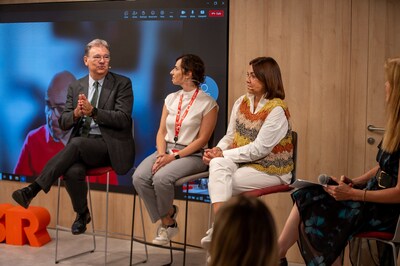Experts ensure that early detection and proper prevention are key to tackling the future challenges of cancer
Press Releases
Sep 13, 2024
Before the start of the ESMO congress, MEDSIR has brought together scientists, researchers, pharmaceutical companies, and patient association representatives to analyse the key points that will drive innovation in breast and lung cancer research and treatment over the next decade.
BARCELONA, Spain, Sept. 13, 2024 /PRNewswire/ — In the framework of the European Society of Medical Oncology (ESMO) congress, held in Barcelona from September 13th to 17th, MEDSIR, a company that is part of Oncoclínicas & Co, dedicated to promoting independent clinical research in oncology internationally, hosted an informational breakfast with key players in cancer research to discuss the present and future of breast and lung cancer treatments. The discussion focused on crucial aspects and challenges for future research, including optimizing the recruitment process, the importance of early detection, access to the most innovative treatments, the promotion of disruptive, collaborative, and international research, and the incorporation of innovative technologies such as Artificial Intelligence.
The event discussed the most recent advances in oncology research and treatment on both national and international levels, with a particular focus on rare cancers with limited therapeutic options. ‘One of the main challenges we will face in the next 10 years is finding ways to integrate treatment innovations with advances in new technologies to offer new hope to patients. Besides new technologies, both proper prevention and early detection remain fundamental tools to stay ahead of the disease,’ says Dr. Antonio Llombart-Cussac, MD, PhD, Senior Scientific Leader at MEDSIR and Head of the Medical Oncology Department at Arnau de Vilanova Hospital.
The importance of international collaboration in research was emphasized by Dr. Carlos Gil Ferreira, Medical Director of Oncoclínicas & Co, the largest oncology treatment group in Latin America. He highlighted the collaboration with MEDSIR to “promote clinical research worldwide thanks to the expertise of our doctors and MEDSIR’s ability to design clinical trials. The synergy between our teams has been fundamental in expanding access to innovative solutions and developing clinical studies that truly impact patient care”.
From the pharmaceutical industry perspective, Maria José Martínez, Medical Head of Solid Tumors at Novartis, stated: “For us, innovation lies in integrating the voices of patients, researchers, and the healthcare system itself into the development of new treatments, adapting to their reality, and ultimately addressing the major challenges in managing the disease”. From the patient’s perspective, the discussion explored unmet needs and the importance of reaching all patients, regardless of the complexity of their condition, to ensure their longevity and quality of life. Pilar Fernández Pascual, President of the Spanish Metastatic Breast Cancer Association, echoed this sentiment, saying, “Patients are in a hurry to live, and that means increasing resources for research, facilitating access to clinical trials, raising awareness of the disease, and shortening the time for approval of innovative drug funding to improve their quality of life”.
Alfonso Aguarón, spokesperson for Lung Cancer Europe (LuCE), added, “Artificial Intelligence provides the opportunity to develop more precise treatments thanks to its vast capacity for global data analysis, ensuring that patients live longer and better.”
Workshop on Artificial Intelligence in Cancer Research
The application of Artificial Intelligence (AI) in research was another key topic of the session. The use of innovative technology is crucial in addressing current research challenges, such as the potential to develop personalized treatments for patients. It also serves as a tool not only to assist oncologists but also to provide more information to patients themselves.
This was demonstrated by Arsela Prelaj, Medical Oncologist at the Istituto Nazionale dei Tumori in Milan, who presented the European I3LUNG project, which seeks to improve the treatment of patients with non-small cell lung cancer (NSCLC), a particularly aggressive form of lung cancer, through AI. “Technology has undoubtedly become a key ally for a comprehensive approach to the disease, facilitating collaboration between Artificial Intelligence and oncologists to achieve increasingly precise and early diagnoses.” Attendees also participated in a practical session on how to apply AI in the interpretation of scientific studies. In addition to Dr. Prelaj, Gustavo Entrala, Senior Advisor at LLYC and expert in digital transformation, stated, “For the first time in history, we have technology that understands us and can help us in decision-making. These tools are increasingly of higher quality and reliability, allowing for the optimization of processes and resources in healthcare, such as detecting patterns in pathologies, clinical diagnosis, or the design and optimization of clinical trials.”
Quality scientific research: among the European Union’s priorities
Recently, Ursula Von der Leyen, President of the European Commission, presented her political guidelines for the next term (2024-2029) under the title “The Choice of Europe“. The document outlines an agenda to address the multiple challenges facing the European Union, including the Biotechnology Law. Similar conclusions were drawn from the report “The Future of European Competitiveness”1, presented by Mario Draghi, former President of the European Central Bank (ECB), which highlights the need to increase investment in research and innovation and the potential role of AI in improving this research.
This strategy is fully aligned with the goals and trajectory of MEDSIR, which has experienced exponential growth in just 13 years, with a vast network of more than 500 independent researchers worldwide and several trials with significant results for the treatment of various types of cancer, such as the recently published PHERGain study in the prestigious journal The Lancet.
An increase in research investment is expected, focusing on strategic priorities, innovative fundamental research, and disruptive advancements.2
Cancer data
Cancer remains one of the leading causes of morbidity and mortality worldwide and in Spain, where approximately 181 million new cases were diagnosed globally in 2020, with projections expected to reach 28 million annually by 2040. In Spain, REDECAN predicts 286,664 cases in 2024. This increase in Spain is due to population growth, aging, and risk factors such as tobacco, alcohol, obesity, and sedentary lifestyles. Among the most prevalent tumours, breast cancer is the most diagnosed globally since 2021, with 36,395 new cases expected in Spain by 2024, and lung cancer remains the leading cause of cancer death, with 18 million deaths in 2020.
MEDSIR has been part of this study alongside other European partners. Moreover, at the ESMO congress, it will present 12 new studies focused on patients with limited therapeutic options, in collaboration with its partner Oncoclínicas & Co. Among the most notable are PECATI, focused on patients with thymic tumors (including thymomas and thymic carcinomas); ABIGAIL, aimed at patients with advanced HR+/HER2- breast cancer with poor prognosis characteristics; and ZZ-FIRST, for patients with metastatic hormone-sensitive prostate cancer who are not candidates for curative treatments.
About MEDSIR
Founded in 2012, MEDSIR stands out for its close collaboration with strategic partners to drive innovation in cancer research. With headquarters in Spain and the United States, the company manages clinical trials from study design to publication, with a vast global network of experts and integrated technology to streamline the process. The company provides support for proof-of-concept trials and a strategic approach that allows research partners to benefit from the best of both worlds: industry clinical research and investigator-driven trials.
In pursuit of promoting independent global research, MEDSIR has established a strategic alliance with Oncoclínicas, the leading oncology group in Brazil, with notable research potential in South America.
For more information: www.medsir.org
About Oncoclínicas & Co.
Oncoclínicas & Co. is the largest group dedicated to cancer treatment in Latin America, with a specialized and innovative model focused on the entire oncology care journey, combining operational efficiency, humanized care, and specialization through a medical team of more than 2,700 specialists with a focus on oncology. With a mission to democratize cancer treatment, it offers an integrated system that combines outpatient clinics with high-complexity oncology centres. The company operates 145 units in 39 Brazilian cities, providing high-quality access in all regions where it operates, aligned with global reference standards.
With a focus on technology, precision medicine, and genomics, Oncoclínicas conducted approximately 635,000 treatments in 2023. It is the exclusive partner in Brazil of the Dana-Farber Cancer Institute, affiliated with Harvard Medical School, one of the leading cancer research and treatment centres in the world. The company also owns Boston Lighthouse Innovation, a bioinformatics company based in Cambridge, USA, and has a stake in MEDSIR, a company dedicated to the development and management of clinical trials for independent cancer research based in Barcelona, Spain. Recently, Oncoclínicas expanded its operations to Saudi Arabia through a joint venture with the Al Faisaliah Group, bringing its mission to conquer cancer to a new continent and providing advanced oncology care on a global scale by combining oncology hyper-specialization with innovative treatment approaches.
The company is part of the IDIVERSA index launched by B3, which highlights companies committed to gender and racial diversity. For more information, visit: www.grupooncoclinicas.com.
1 Comisión Europea. The future of European competitiveness: Report by Mario Draghi
2 ConSalud. Así es la nueva Ley de Biotecnología de la UE aplaudida por el sector farmacéutico. Link
![]() View original content to download multimedia:https://www.prnewswire.com/news-releases/experts-ensure-that-early-detection-and-proper-prevention-are-key-to-tackling-the-future-challenges-of-cancer-302247710.html
View original content to download multimedia:https://www.prnewswire.com/news-releases/experts-ensure-that-early-detection-and-proper-prevention-are-key-to-tackling-the-future-challenges-of-cancer-302247710.html
SOURCE MEDSIR



